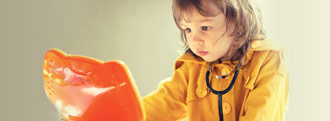Our Health Library information does not replace the advice of a doctor. Please be advised that this information is made available to assist our patients to learn more about their health. Our providers may not see and/or treat all topics found herein.
Uv index
The UV index forecasts the intensity of ultraviolet (UV) light for a given day. The index helps people know what precautions to take to avoid sunburn or other skin damage from being in the sun too long.
The UV index is listed on local weather reports. Sun protection measures, such as wearing sunscreen, should always be taken when the UV index is 5 or above. The UV index is measured on a scale of 0 to 11+.
- 0 to 2: Low exposure to UV rays is expected for that day. Wear UV-blocking sunglasses on bright days, and cover up your skin if it burns easily. Snow and water can reflect the sun's rays and increase the UV strength. Skiers and swimmers should take special care: they should wear sunglasses or goggles and apply on any bare skin a broad-spectrum sunscreen with an SPF of at least 30.
- 3 to 5: Moderate exposure is expected for that day. If you will be outside, wear protective clothing, a wide-brimmed hat, and UV-blocking sunglasses. Stay in the shade between 10 a.m. and 4 p.m. If you will be in the sun, apply on any bare skin a broad-spectrum sunscreen with an SPF of at least 30.
- 6 to 7: High exposure is expected for that day. Protective measures include covering up by wearing a wide-brimmed hat and UV-blocking sunglasses, staying in the shade between 10 a.m. and 4 p.m., and using on any bare skin a broad-spectrum sunscreen with an SPF of at least 30.
- 8 to 10: Very high exposure is expected for that day. Limit the time you spend outdoors between 10 a.m. and 4 p.m. Wear protective clothing, a wide-brimmed hat, and UV-blocking sunglasses. Other protective measures include staying in the shade and using on any bare skin a broad-spectrum sunscreen with an SPF of at least 30.
- 11+: Extreme exposure is expected for that day. Avoid sun exposure between 10 a.m. and 4 p.m. Unprotected skin can burn in minutes. Everyone should cover up and wear a hat and UV-blocking sunglasses. White sand and other bright surfaces reflect UV and will increase UV exposure. Stay in the shade as much as possible, and use on any bare skin a broad-spectrum sunscreen with an SPF of at least 30.
Current as of: December 4, 2024






